Last week, the media in Central Asia covered several crucial political events, such as Tajikistani President Emomali Rahmon’s visit to Moscow and Kazakhstan and Uzbekistan holding their first Foreign Ministers’ Council Meeting. They also covered various important stories pertaining to nuclear energy. For instance, Kazakhstan established a new Nuclear Energy Agency, the head of UzAtom confirmed they were negotiating with French companies to participate in the construction of a small NPP in the Jizzakh region, and Kazatomprom revealed that it doubled its profits last year. Several outlets reported on Kazakhstan and China signing their first MoU regarding water resource management. Other sources noted the announcement that Tajikistan and Kyrgyzstan will inaugurate a new high-voltage electricity transmission line as part of the CASA-1000 project. As countries in the region continue to struggle with inflation, the Uzbekistani Central Bank confirmed it raised its base interest rate to 16%.
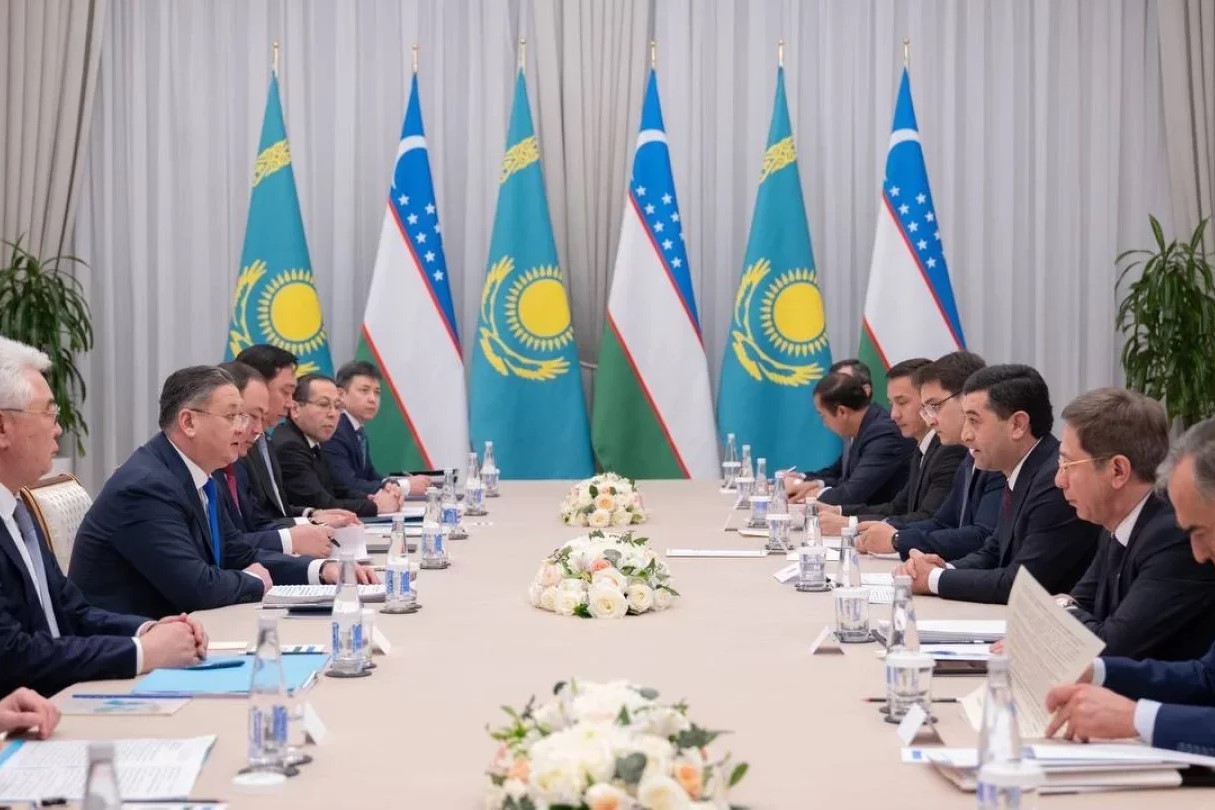
Uzbekistan and Kazakhstan held their first Foreign Ministers’ Council Meeting in Khiva. Source: Orda
Diplomatic Events
Uzbekistan and Kazakhstan held their first Foreign Ministers’ Council Meeting in Khiva, Uzbekistan (Orda.kz). During the meeting, Kazakhstani Foreign Minister Murat Nurtleu and Uzbekistani Foreign Minister Bakhtiyor Saidov discussed political, economic, trade, energy, and transport cooperation. Specifically, they emphasised the importance of a number of projects, such as the Kambarata-1 hydroelectric power plant (HPP) in Kyrgyzstan and the Trans-Caspian International Transport Route. They also explored establishing the International Center for Industrial Cooperation “Central Asia,” increasing trade with Afghanistan, and the recently opened Kazakhstan Trade Pavilion at the AIRITOM Special Economic Zone (SEZ) in Termez near the Afghanistan border (Daryo). Concluding their meeting, both Foreign Ministers signed a protocol regarding their agreements and future plans. This consultation follows President Mirziyoyev’s visit to Astana in August 2024, where both countries signed up to a 10-year Strategic Partnership and Alliance Programme and agreed to increase trade turnover to $10 billion by 2030.
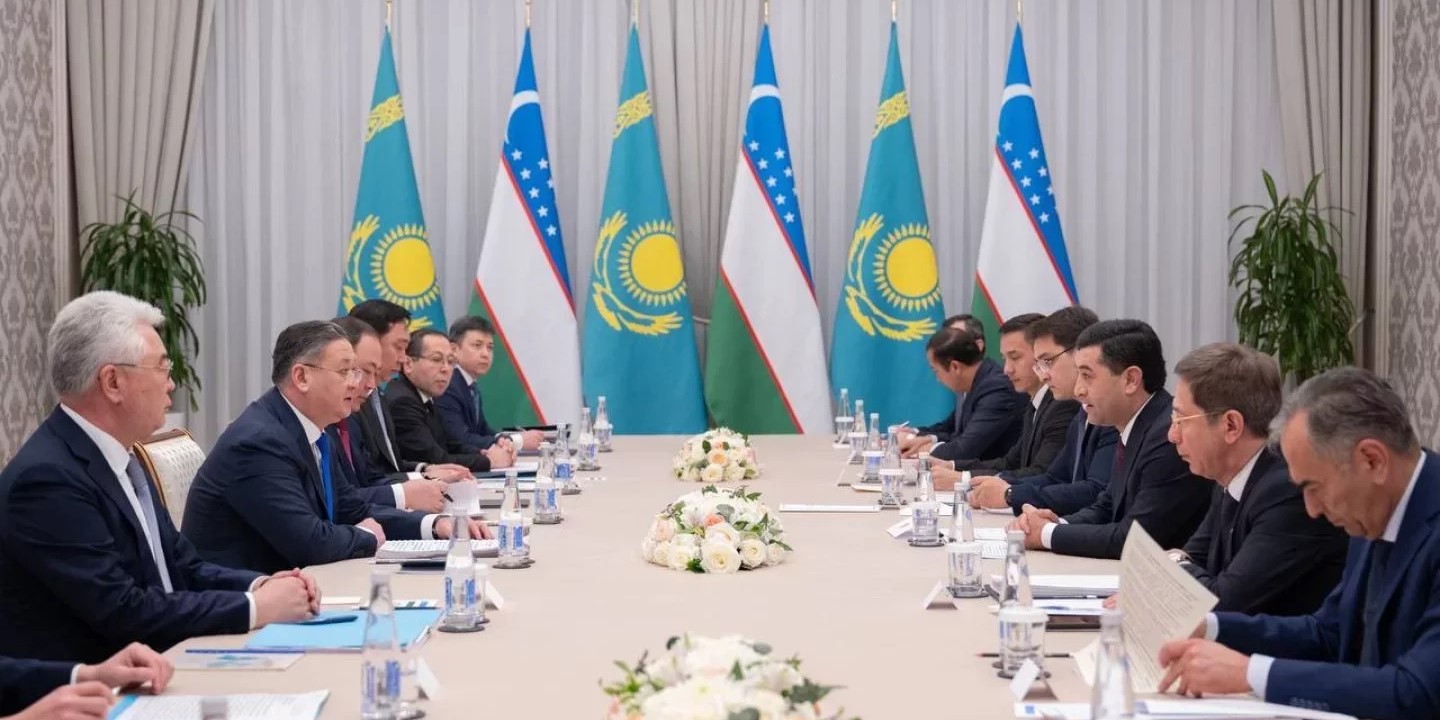
Uzbekistan and Kazakhstan held their first Foreign Ministers’ Council Meeting in Khiva. Source: Orda
Tajikistani President Emomali Rahmon visited Moscow on March 16 (Asia Plus). According to reports, the Tajikistani President discussed strengthening the strategic alliance between Tajikistan and Russia, as well as trade, investment, and humanitarian cooperation with President Putin (Asia Plus). After their deliberations, both leaders signed a number of documents concerning industrial collaboration, the establishment of a new industrial park, land restoration, defence cooperation, and digitalisation, among others (Asia Plus). The two Presidents also participated via video link in a ceremony marking the start of construction of the new International Education Centre and State Russian Drama Theatre in Dushanbe (Asia Plus). Russia remains one of Tajikistan’s leading trade and investment partners. Last year, bilateral trade rose 7% to $1.5 billion (Asia Plus). Both countries are also taking steps to increase their trade turnover by 2.5 times by 2030. Earlier, we reported that both countries ceased using foreign currencies in their transactions in 2024.
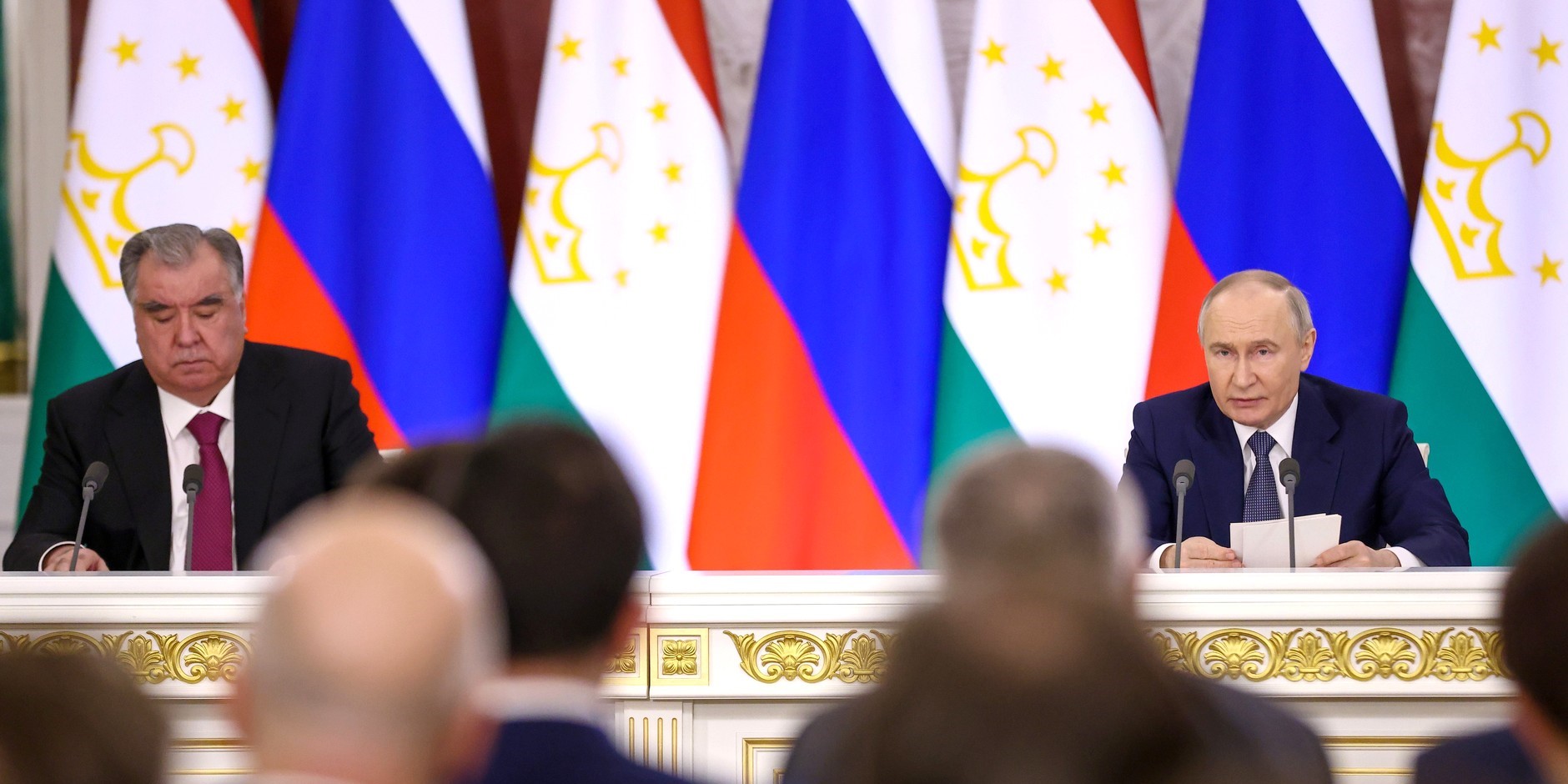
Tajikistani President Emomali Rahmon visited Moscow last week. Source: Kremlin
Water
Kazakhstan and China have signed their first Memorandum of Understanding regarding the management of water resources (Daryo). Kazakhstan’s Vice Minister of Water Resources and Irrigation, Nurlan Aldamzharov, and China’s Deputy Minister of Water Resources, Li Liangsheng, signed the MoU during a meeting of the Kazakhstan-China Cooperation Committee in Beijing. The agreement aims to strengthen cooperation in managing water resources, establish joint training programs, and promote digitalization. The signing of this MoU comes as China’s efforts to expand irrigation and agriculture in Xinjiang threaten the sustainability of transboundary water sources such as the Ili River, which flows into Lake Balkhash (Eurasianet).
Uzbekistan and Turkmenistan have agreed to conduct joint research on transboundary water resources and digitize water management (Daryo). The agreement follows the visit of a delegation from the Uzbekistani Ministry of Water Resources to Turkmenistan. Both countries also pledged to enhance water infrastructure and flood defences along the banks of the Amu Darya River. The delegation also inspected the Tuyamuyun Hydro Complex and explored measures to improve the flow of the Amu Darya and prevent water loss.
The French company Suez will administer three water supply projects in Uzbekistan’s Surkhandarya and Kashkadarya regions (Gazeta.uz). The projects, worth around $340 million, include the construction of an 82-kilometer main water pipeline for the city of Karshi and modernising Surkhandarya’s water supply system. Suez will take over the operation of the water systems in the Denau, Shurchi, Sariosiyo, and Kumkurgan districts of the Surkhandarya region. They aim to reduce water losses by two billion cubic metres annually and extend water supply to an additional one million people. They will also introduce various digital solutions, such as a real-time network map, SCADA, GIS and Aquadvance, to manage water distribution. In addition, they will also install 15 flow monitoring devices, flow meters at three pumping stations, water consumption tracking equipment at five wells, and 3100 meters across the network. They will also conduct a survey to update consumer data, assess the network for possible future expansion, equip water network personnel with ten new computers and 61 tablets, and train 450 new staff. Previously, Suez signed a seven-year deal with Toshkent Shahar Suv Taminoti to upgrade Tashkent’s water supply system in 2023.
Kyrgyzstan signed several agreements with the Xinjiang Uyghur Autonomous Region during a meeting in Urumqi (XUAR) (Daryo). The meeting was attended by Kyrgyzstan’s Prime Minister, Adylbek Kasymaliev, Minister of Water Resources, Agriculture, and Processing Industry, Bakyt Torobaev, and Chairman of the People's Government of the XUAR, Erkin Tuniyaz. The agreements include a Memorandum of Intent to establish relations between the XUAR and the Chui region of Kyrgyzstan, an action plan for cooperation in metrology, and a memorandum of understanding between Jitong Trading Xinjiang and Xinjiang Bank. They also discussed improving the operation of border checkpoints and increasing economic, energy, and agriculture ties between the XUAR and the Issyk-Kul region in Kyrgyzstan. In addition, they explored the development of the “Two Countries – Two Parks” project, which aims to create interconnected industrial zones to bolster bilateral trade. Bakyt Torobaev also met Politburo member Xingrui Ma and discussed increasing trade to $45 billion by 2030.
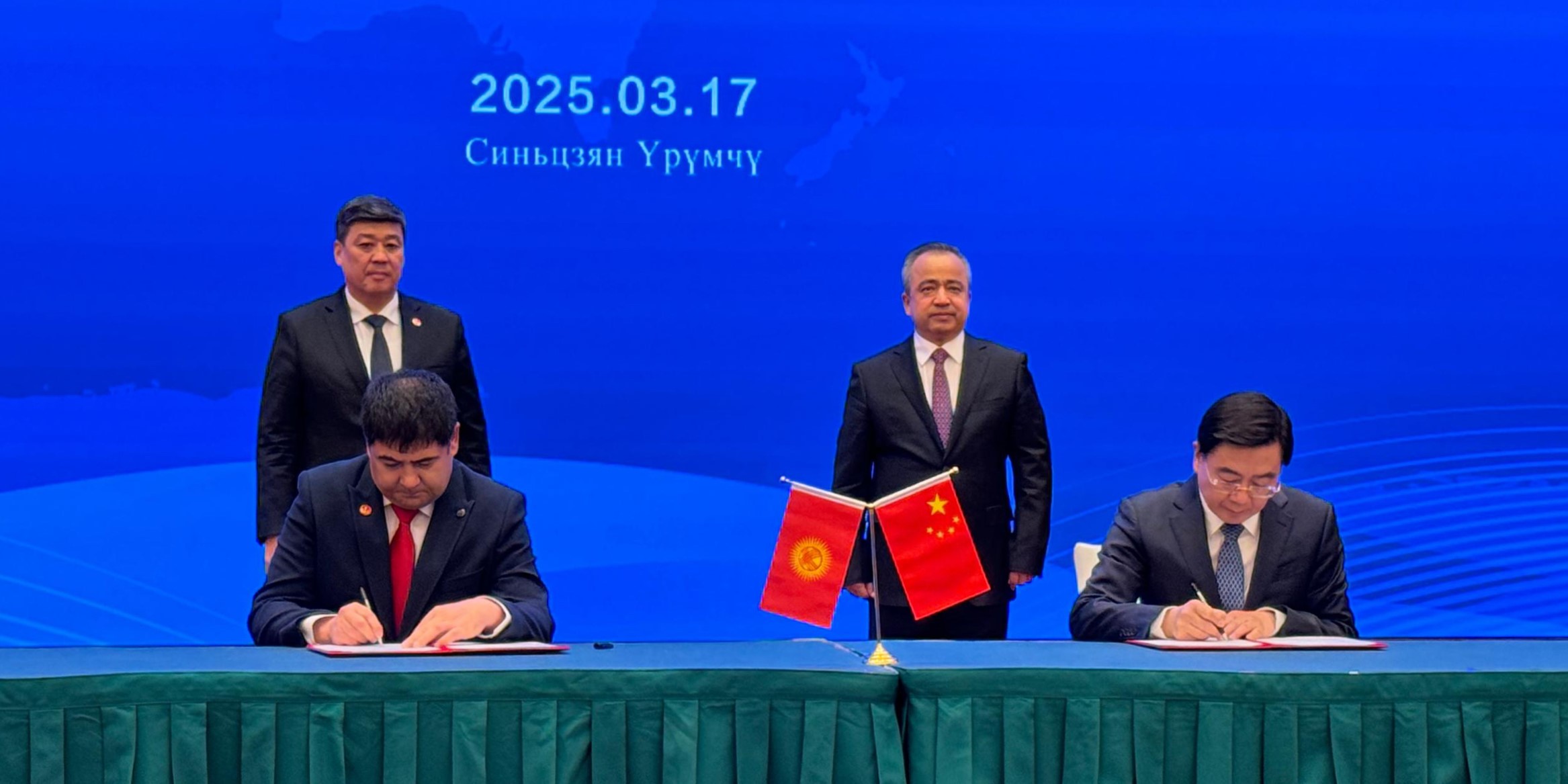
A Kyrgyzstani delegation signed several agreements with the Xinjiang Uyghur Autonomous Region. Source: Daryo
Investment
The EU has announced new investments in Tajikistan as part of its Global Gateway Initiative (Asia Plus). During EU Commissioner for International Partnerships Jozef Síkela’s visit to Tajikistan last week, Tajikistan signed two deals with EU partners. The first is a $20 million investment grant from the European Bank for Reconstruction and Development (EBRD) to modernise Tajikistan’s electricity transmission network. The second is another $20 million grant from the German Agency for International Cooperation to support sustainability in Tajikistan’s cotton sector. The EU delegation also announced the provision of $10 million from a $30 million budget support programme to aid in implementing the National Strategy for Education Development 2030 and the Program for Professional Training of Citizens 2021- 2025. Globally, the Global Gateway Initiative seeks to mobilise $300 billion of investment to improve connectivity, research, education, and digitalisation.
The EU Commissioner for International Partnerships, Jozef Síkela, visited Uzbekistan on March 18 (The Times of Central Asia). He met with Uzbekistani President Shavkat Mirziyoyev and discussed digital connectivity, critical raw materials, and the Trans-Caspian International Transport Route. Both sides signed two agreements for two EU-funded projects as part of the Initiative on Digital Connectivity in Central Asia. The Connectivity for Central Asia project seeks to improve digital connectivity between Central Asian countries, enhancing regional integration and economic growth. The Satellite Connectivity for Underserved Populations Project will provide high-speed internet access to remote communities. He toured the Almalyk Mining and Metallurgical Complex during his visit and explored possible investments in critical raw materials.
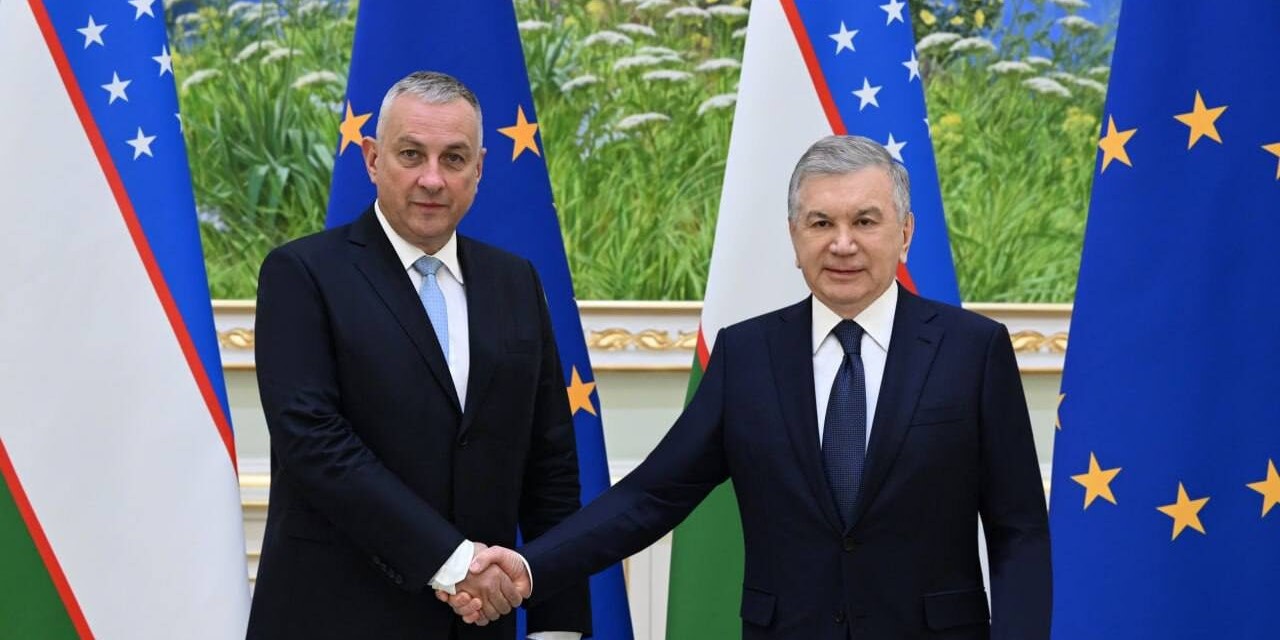
The EU and Uzbekistan concluded several deals on the last leg of EU Commissioner for International Partnerships Jozef Síkela’s tour of Central Asia. Source: Times of CA
Nuclear Energy
Kazakhstan formed a new Nuclear Energy Agency on March 18 (Vlast.kz). President Kassym-Jomart Tokayev signed the official decree establishing the agency following his announcement at the National Kurultai on March 14. Former Energy Minister Almasadam Satkaliyev will head the new agency, which will report directly to the President. The new agency will take over several responsibilities from the Energy Ministry, such as uranium mining, nuclear energy, radiation safety, and the management of former nuclear sites like the Semipalatinsk test area.
The Director of UzAtom Azim Akhmedkhadjaev confirmed that negotiations are ongoing with several French companies interested in participating in the construction of a small nuclear power plant (NPP) in the Jizzakh region of Uzbekistan (Kun). According to Akhmedkhadjaev, they are currently negotiating with Assystem, Bureau Veritas, and Framatome. In February, he stated that Uzbekistan planned to create an international consortium to construct a small NPP. The project will be based on the Russian RITM-200N water-cooled reactor and incorporate Chinese and European hardware and software. President Shavkat Mirziyoyev recently visited France to discuss expanding cooperation across a range of sectors, particularly energy. France is also interested in Uzbekistan’s uranium deposits, given possible reductions in supply from Niger. During the recent visit, French nuclear fuel company Orano signed an agreement with Navoiyuran to expand their partnership and grow production at the South Djengeldi uranium deposit.
Kazakhstan’s national nuclear company, Kazatomprom, doubled its annual profits in 2024 (Kursiv). Last year, the world’s largest uranium producer reported net profits of $2.2 billion, an increase of 95% compared to the $1.1 billion earned in 2023. The strong results are due to net profits of $598.6 million from the Kazakhstani-Russian Budenovskoye joint venture, over which Kazatomprom recently gained control. The rise in uranium oxide prices also contributed to the increase in net profit. Uranium oxide prices grew 30% in 2024 to $170 per kilogram. Sales exceeded their forecasts, while sales-related costs fell by 9% from $58.1 million to $52.6 million.
Trade
Kazakhstan aims to expand trade with Hungary from $200 million in 2024 to $700 million in the coming years (Kursiv). Kazakhstan’s Minister of Trade and Integration, Arman Shakkaliyev, announced this goal during a trade mission to Budapest. He added that Kazakhstan will export an additional 95 items across the metallurgical, agricultural, construction, and engineering sectors. Following a meeting with Hungary’s Deputy Minister of Foreign Affairs and Trade Levente Magyar, they announced that Hungary would invest $62 million in establishing four new agricultural enterprises in Kazakhstan, including a premix factory in the Almaty region, a compound feed factory in Kostanay and other enterprises in Saran and Turkestan. Hungarian pharmaceutical company Gedeon Richter also revealed that they are exploring establishing production facilities in Kazakhstan. Moreover, the Kazakhstani delegation stated Kazakhstan’s intention to set up a QazTrade office in Budapest to promote Kazakhstani products. These announcements come after President Tokayev instructed to increase trade with Hungary to $1 billion. As noted above, bilateral trade increased by 4.4% to roughly $200 million last year, with Kazakhstani exports reaching $5.3 million and imports accounting for $190.5 million.
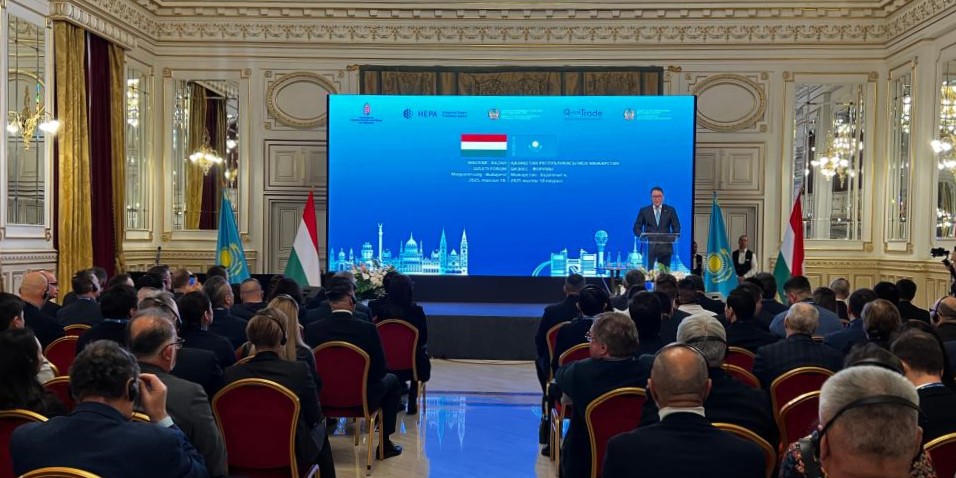
A Kazakhstani trade mission visited Budapest last week. Source: Kazakhstan's Embassy in Budapest
Last week, Uzbekistan’s Minister of Investments, Industry, and Trade, Laziz Kudratov, held talks with Kazakhstan’s Minister of Trade and Integration Arman Shakkaliyev (UZ Daily). They explored the implementation of key investment, trade, and economic agreements. They noted the opening of a Kazakhstani pavilion at the Termez International Trade Centre and bilateral trade turnover rising to $4.3 billion in 2024. They concluded the meeting by signing a programme to increase trade to $10 billion by 2030.
Infrastructure
The Kazakhstani Senate has approved the construction of the “Central Asia” Industrial Cooperation Centre on the Kazakhstani-Uzbekistani border (Kursiv). According to Senate member Alisher Satvaldiyev, the center will be built near the Atamaken border crossing in Kazakhstan and the Guliston crossing in Uzbekistan. He also said that Trans-Continental Logistics Group is the principal investor, and the project is expected to cost around $53.8 million. Both countries are expected to allocate 50 hectares of land to the centre. Overall, the center will improve regional logistics and facilitate the development of the pharmaceutical, electrotechnical, chemical, and textile industries. They plan for the center to begin operations at the end of 2026.
Kyrgyzstani Minister of Energy Taalaibek Ibraev confirmed that the 500 kV transmission line connecting Kyrgyzstan and Tajikistan under the CASA-1000 will commence operations on March 31 (Kazinform). He made the announcement during a meeting with a World Bank delegation led by Infrastructure Regional Director for Europe and Central Asia, Charles Cormier, and World Bank Regional Director for Central Asia, Tatiana Proskuryakova. The new transmission line will connect the Sugd-500 substation in Tajikistan to the Datka substation in Kyrgyzstan. The CASA-1000 project, valued at $1.2 billion, will transmit electricity between Kyrgyzstan, Tajikistan, Afghanistan, and Pakistan once operational.
Inflation and Interest Rates
On March 20, Uzbekistan’s Central Bank raised its base interest rate to 14% from 13.5% (Gazeta.uz). Justifying their decision, they cited rising inflation and inflation expectations, demand growth, the national currency's depreciation, and increased lending and remittances. The Central Bank cut their base rate to 13.5% from 14% in July 2024. Since the beginning of 2025, annualized inflation has risen to 10.1%. The increase in the cost of fuel, utilities, transport, medical services, and education has seen societal inflation expectations soar to 15.3% and those of entrepreneurs to 13.8%. The Central Bank also confirmed they could increase the base interest rate further if inflationary conditions do not improve significantly. Last week, we reported that the National Bank of Kazakhstan also increased its base interest rate to 16% to combat surging inflation.

